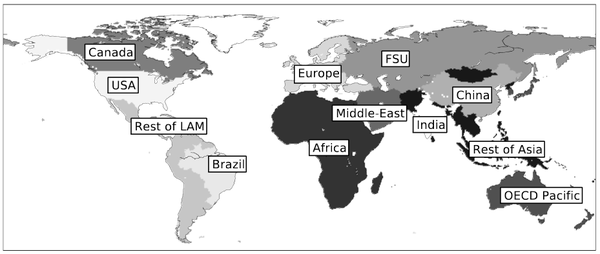Spatial dimension - IMACLIM: Difference between revisions
Jump to navigation
Jump to search
No edit summary |
No edit summary |
||
| Line 4: | Line 4: | ||
}} | }} | ||
Imaclim-R is a global model of the world economy, divided into 12 regions: | Imaclim-R is a global model of the world economy, divided into 12 regions as shown in <xr id="fig:imaclim_1"/>: | ||
*USA | *USA | ||
| Line 19: | Line 19: | ||
*Rest of Latin America | *Rest of Latin America | ||
<figure id="fig:imaclim_1"> | |||
[[File:35815647.png]] | [[File:35815647.png|none|600px|thumb|<caption> Regional disaggregation of Imaclim-R model. OECD Pacific includes Australia, New Zealand, Japan and South Korea. FSU = Former Soviet Union, Rest of LAM = Rest of Latin America</caption>]] | ||
</figure> | |||
Revision as of 15:56, 29 September 2016
| Corresponding documentation | |
|---|---|
| Previous versions | |
| Model information | |
| Model link | |
| Institution | Centre international de recherche sur l'environnement et le développement (CIRED), France, http://www.centre-cired.fr., Societe de Mathematiques Appliquees et de Sciences Humaines (SMASH), France, http://www.smash.fr. |
| Solution concept | General equilibrium (closed economy) |
| Solution method | SimulationImaclim-R is implemented in Scilab, and uses the fonction fsolve from a shared C++ library to solve the static equilibrium system of non-linear equations. |
| Anticipation | Recursive dynamics: each year the equilibrium is solved (system of non-linear equations), in between two years parameters to the equilibrium evolve according to specified functions. |
Imaclim-R is a global model of the world economy, divided into 12 regions as shown in <xr id="fig:imaclim_1"/>:
*USA *Canada *Europe *OECD Pacific *Former Soviet Union *China *India *Brazil *Middle East *Africa *Rest of Asia *Rest of Latin America
<figure id="fig:imaclim_1">
</figure>
